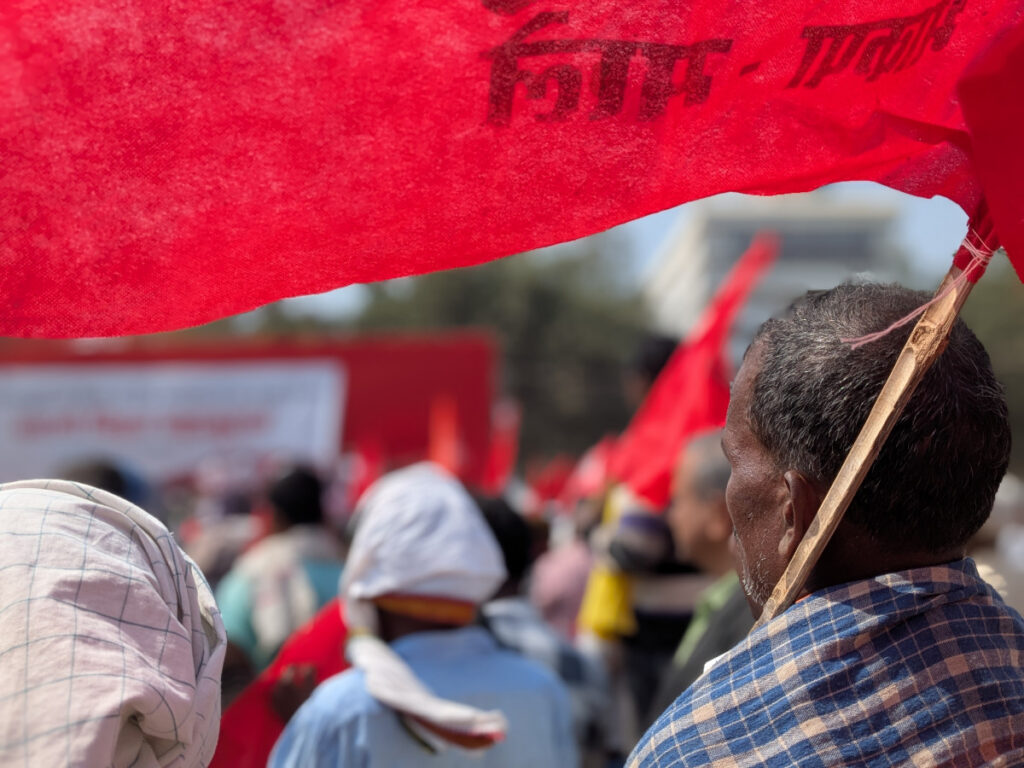PATNA: Though the “Badlo Bihar Mahajutan (Change Bihar Maha-Rally)” organised by the CPI (ML) Liberation on March 2 appeared to be a Bihar centric event, in reality, it carried a pan-India message which will have critical impact on the ideological and philosophical subtleties of the political structure and institution of the country.
Like every political party, the rally being held just a few months away of the assembly election, this would also be construed as an attempt of the CPI(ML) to reach out to the electorate. But undoubtedly it would be a simplistic narration. The rally tried to set new agenda which is closely linked to the common people and imbibes their aspiration.
General secretary of the CPI(ML), Dipankar Bhattacharya said that the concept of social engineering which is based on the caste orientation ought to be given a new idea and dynamics. According to him the new concept and idea should be based on the principle of occupational demand based solidarity, precisely it could be christened as “occupational solidarity”.
While the CPI(M) does not hold BJP as a fascist force, Bhattacharya used the occasion to convey that India was under the rule of fascism. He said; “ The election year has just begun in Bihar. The BJP juggernaut is ready with all its tricks, trying to brow beat Bihar with its customary bravado and braggadocio. Bihar and India deflated its ‘400 paar’ balloon in the last Lok Sabha elections. In the Assembly election, Jharkhand has again shown how the BJP can be stopped in its tracks by sticking to an agenda of the people. Bihar in 2025, West Bengal in 2026 and Uttar Pradesh in 2027 will be the three most crucial battles before the next Lok Sabha polls. A decisive defeat of the BJP/NDA in Bihar will bolster the spirit and strength of the entire Indian people in the battle to free India from the clutches of fascism.”
He feels that time is ripe for bringing about some major strategical changes. Bhattacharya said; “ Bihar must foil this cynical divisive and deceitful games in the name of social engineering and insist on the fulfilment of the 65 percent expanded reservation which will give increased share to all sections of the bahujan society and the common demands of education and jobs, increased wages and improved living conditions, cutting across caste boundaries”.
Bhattacharya also underlined; “Election season in Bihar means caste rallies. The BJP is always keen to cement its agenda of communal polarisation with caste-based social engineering to divide and align people according to its electoral game plan. The ‘double engine’ dispensation has been playing cynical games with caste identities, shifting people across SC/ST/EBC categories to earn electoral dividends, all the while subverting and truncating the only constitutional caste-based right of reservation in education and jobs.”
At a time when most of the Communist Parties are either in a stage of trance or are engaged in polemics and struggling to cope with the threat of survival, CPI(ML) is going ahead steadily and trying to change the nature and content of the political discourse. This is the reason that nearly 100 organisations, having divergent political approach and perception to the prevailing political scenario, preferred to participate in the rally. What was most significant was the CPI(ML) leadership allowed these organisations to place their views and share them with the supporters and cadres of CPI(ML). They did not nurse any sectarian approach and view. These organisations spoke of their experience of struggles and of demands including welfare of labourers, rights of workers from different disciplines and farmers.
The CPI (ML) also released 18-point charter which include the implementation of various welfare measures for farmers, landless and homeless people, respectful life for labourers, scheme workers, contractual workers and outsourcing workers, uniform education and job to students and youths along with rights of women and minorities. It also talks about flood and draught control, protection of environment, free treatment for the poor, promotion of startup and entrepreneurship.
Addressing the gathering, Bhattacharya said that the sufferings of the poor, farmers, labourers, Dalits, tribals, women, Muslims, street vendors is increasing day by day in the state. “Now, time has come to turn this suffering into strength. Today we have an opportunity to bring people, who have been fighting on different issues, on one platform. All these issues are getting organised towards the same direction, and a pledge is being taken from Gandhi Maidan today to bring change in Bihar,” he told the gathering. On this occasion he gave a call to build a narrative around these issues in upcoming Bihar assembly elections.
“BJP wants to make Bihar a laboratory of oppression and suppression. But Bihar has always been a laboratory of struggle. We will not let the conspiracy of BJP succeed. Bihar will move forward and it will change,” he said. According to him the Mahajutan is an “Expression of Growing Unity” and determination of the Working People in Bihar.
Bhattacharya said: “After victories in Haryana, Maharashtra and Delhi, the BJP is in a very upbeat mood about turning Bihar into another Maharashtra where the party has successfully split regional parties, including its old ally Shiv Sena, and used them as stepping stones to install a BJP-led government in the state. It is hopeful that Nitish Kumar’s prolonged alliance with the BJP for the last three decades, which has already enabled the latter to gain considerable ground and grip in Bihar, will now pave the way for a new phase where the BJP can form a government under its own direct leadership to turn Bihar into another laboratory of Bulldozer Raj to unleash the trident of feudal coercion, communal violence and state repression.”
He however said: “The first pre-poll survey from Bihar however has indicated a different public mood in the state. 50 percent respondents expressed not just their disapproval regarding the performance of the government but also their desire for a change of government. Another 22 percent are unhappy with the government though still not ready for change. In other words, more than seventy percent respondents are thoroughly disappointed and disillusioned with the NDA government in Bihar. The NDA government is aware of this ground reality. Neither the BJP nor Nitish Kumar’s JDU is ready to face the people on their issues. The BJP is busy with its sinister design of communal polarisation while Nitish Kumar is resorting to increased police terror and bureaucratic high handedness to suppress the voices of popular dissent.
Bhattacharya mentioned : “The working people of Bihar fighting for secure livelihood and improved living conditions who have been at the receiving end of the ‘double engine’ regime’s prolonged reign of betrayal are no longer ready to accept the empty NDA rhetoric of ‘development with justice’ and ‘good governance’. The anger is turning into a resolve for change, disparate demands related to the rights of diverse sections of people are crystallizing into a combined charter of change, separate organisations and struggles of the working people are coming together to forge ties of solidarity in collective action.”
He said: “The Badlo Bihar Mahajutan became a powerful statement of this growing unity and resolve of the fighting people of Bihar. While the budget and the customary Governor’s address in the beginning of the budget session once again turned a blind eye to the reality of Bihar, the Mahajutan turned into a grand assembly of the people raising their just and longstanding demands. To foil the BJP’s bid to do a Maharashtra in Bihar, the spirit and agenda of the Mahajutan will now have to be taken to every nook and corner of the state.”
Bhattacharya elaborates: “For years Nitish Kumar raised the demand for special state status for Bihar which would have given Bihar a bigger federal share. This was a perfectly legitimate demand in view of Bihar’s historical backwardness and the loss of minerals and industry following the bifurcation of the state and creation of Jharkhand as a separate state. Following Narendra Modi’s ascent to power when the NDA regime in Bihar clearly should have had the ‘double engine’ power, Nitish Kumar however dropped the demand and substituted the idea of a ‘special package’. This special package is turning out to be a deceitful slogan of special betrayal for Bihar. The massive and deeply entrenched incidence of poverty in Bihar has most recently been revealed again in the socio-economic household survey done by the Bihar government which found 34 percent of Bihar surviving on a monthly family income of less than six thousand rupees. Nearly another thirty percent had an income level of less than ten thousand rupees per month.”
He said: “The survey findings present a picture of chronic poverty, which must also mean massive indebtedness, a crisis that has not yet attracted due attention in economic studies on Bihar. If one measures the performance of Bihar in terms of the much trumpeted sustainable development goals 2030, the state sits on the lowest rung among all Indian states. In terms of the core five development goals of no poverty (SDG1), zero hunger (SDG2), good health and well-being (SDG3), quality education (SDG4) and decent work and economic growth (SDG8), Bihar’s score remains the lowest in India with just 43.2% achievement of minimum targets that are meant to be met by 2030. Any meaningful package must attack Bihar’s deep rooted poverty and unemployment and address the core development goals of quality education, living wages, social security and public health and not just showcase airports and expressways”. (IPA Service)

 Can Govt Complete Delimitation Process Before Lok Sabha Election 2029?
Can Govt Complete Delimitation Process Before Lok Sabha Election 2029? 